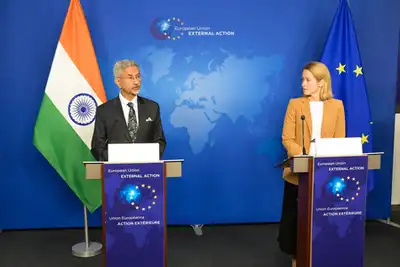Reiterating that India will not give in to any kind of nuclear blackmail, External Affairs Minister (EAM) S. Jaishankar on Tuesday reaffirmed that the country strongly believes in zero tolerance for terrorism in all its forms and manifestations.
“This is not a conflict between two states per se. This is actually a response to the threat and to the practice of terrorism. So, I would urge you to don’t think of it as India-Pakistan, think of it as India and ‘Terroristan’, you would then appreciate,” Jaishankar said while addressing a joint press conference with European Union High Representative and Vice-President of the European Commission Kaja Kallas in Brussels.
Asserting that terrorism is a shared and interconnected challenge for the global community, the EAM mentioned that it is imperative that there must be strong international cooperation and understanding on the matter.
EAM Jaishankar and Kallas were addressing the media after holding the first strategic dialogue between India and the European Union where both sides held an open and productive meeting with discussions focused on defence and security – including maritime, cyber and space.
“Nuclear threats cannot pay off. This is a mutual concern. We see different actors in the world using it. In this global changing world, we need more partners, and therefore we are working to intensify our cooperation regarding security and defence,” Kallas stated.
EAM Jaishankar highlighted that both sides exchanged views on global order, including the situation in Europe, the Ukraine conflict, the Middle East, the Indian subcontinent and Indo-Pacific.
“My visit to Brussels is taking place three months after that of the EU College of Commissioners to India. Even in that time, it was apparent that the world order was in the midst of a profound change. These trends have intensified in many ways. We have entered an era of multipolarity and strategic autonomy, which are two important forces for India and the EU to forge deeper ties. Working towards that goal requires intensified cooperation in many domains,” he stated
